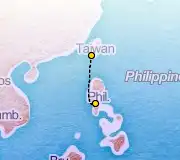The Port of Manila is the primary seaport of the Philippines, situated on the eastern shores of Manila Bay.
As the country's busiest and most important port, it serves as a crucial gateway for both international trade and domestic shipping.
For cruise passengers, it offers a direct entry point to the nation's bustling capital and its rich historical and cultural attractions.
The port is a vast complex of piers and terminals, reflecting its significant role in the Philippine economy and its growing importance as a cruise destination in Southeast Asia.
The top attraction is the historic walled city of Intramuros, located just a short drive from the cruise port.
Within its walls, you can explore key landmarks like Fort Santiago, a 16th-century citadel, and the San Agustin Church, a UNESCO World Heritage Site.
Adjacent to Intramuros is Rizal Park, a large and historically significant urban park dedicated to the national hero, José Rizal.
Nearby, you'll find the National Museum Complex, which includes separate museums for Fine Arts, Anthropology, and Natural History, all offering free admission.
Last updated on June 25, 2025
A popular full-day excursion is a trip to Tagaytay, located approximately 60 kilometers (37 miles) south of Manila.
Known for its cooler climate and stunning views of the Taal Volcano situated in a lake, the journey can take 2-3 hours each way depending on traffic.
Another significant historical destination is Corregidor Island, located at the entrance of Manila Bay. The island served as a major coastal defense fort during World War II and can be reached by a ferry service from a terminal in Manila, with the trip taking about 90 minutes each way.
Last updated on June 25, 2025
The Port of Manila is located in the Port Area district, directly on the shores of Manila Bay.
It is conveniently situated just west of the city's historic heart, with the main gates being less than 2 kilometers (about 1.2 miles) from Intramuros.
The port itself is an industrial and commercial harbor with limited passenger amenities, so transportation such as a shuttle bus, taxi, or pre-booked car is necessary to reach any attractions.
Cruise ships typically dock at one of the piers, but tendering can occur if all berths are occupied.
Last updated on June 25, 2025
The official currency is the Philippine Peso (PHP).
While some major tourist establishments may accept US dollars, it is highly recommended to use the local currency for most transactions to get better rates.
ATMs are widely available throughout the city, especially in malls, banks, and commercial districts.
Credit cards are accepted in most hotels, major restaurants, and large shopping centers, but smaller vendors and local markets typically require cash.
Last updated on June 25, 2025
Manila is generally safe for tourists who take standard precautions.
Be mindful of your belongings in crowded areas such as markets, tourist spots, and on public transport to avoid pickpockets and petty theft.
It is advisable to use reputable, metered taxis or well-known ride-sharing apps rather than hailing unmarked vehicles.
Exploring major tourist areas like Intramuros, Rizal Park, and the central business district of Makati is considered safe during the day.
While independent exploration is possible, guided tours can provide a more secure and hassle-free experience for first-time visitors.
Last updated on June 25, 2025
Manila has a tropical climate, characterized by hot and humid conditions year-round.
The main cruise season typically coincides with the dry season, which runs from December to May. During this period, temperatures range from 21°C to 34°C (70°F to 93°F) with less rainfall and more sunshine.
The wet season occurs from June to November and is marked by a higher chance of rain and the possibility of typhoons.
Passengers should pack lightweight, breathable clothing, sunscreen, and a hat. It is also wise to carry a light rain jacket or umbrella for unexpected showers, even during the dry season.
Last updated on June 25, 2025
Taxis and ride-sharing services are the most convenient transportation options for cruise passengers. Metered taxis are available, but it is advisable to insist on using the meter or agree on a fare beforehand.
Public transportation includes the iconic Jeepneys and city buses, which are inexpensive but can be crowded and confusing for first-time visitors.
The city also has a light rail system, including the LRT Line 1, with stations that can get you close to some attractions, though a taxi is still needed to get from the pier to a station.
Due to the port's industrial nature, transportation is required to reach any tourist sites.
Last updated on June 25, 2025
Manila is a major shopping destination with numerous options. For a modern shopping experience, visit one of the massive malls like SM Mall of Asia, which is one of the largest in the world and a short taxi ride from the port.
For authentic Filipino souvenirs and handicrafts, Kultura Filipino stores, found in most major malls, offer a curated selection of items like shell crafts, woven textiles, and wood carvings.
Local specialties to look for include south sea pearls, Barong Tagalog (traditional formal wear), and food items like dried mangoes and local coffee.
Prices in malls are fixed, but haggling is expected and acceptable in local markets and with street vendors.
Last updated on June 25, 2025



No ships scheduled in port today.
Last updated on June 13, 2025
Taxis and ride-sharing apps like Grab are readily available at the cruise terminal; however, pre-booking a tour or transfer can offer more convenience and fixed pricing to reach main attractions.
The historic walled city of Intramuros, featuring Fort Santiago and San Agustin Church, is a short taxi ride away and offers a glimpse into Spanish colonial history.
Near the port, try Filipino staples like adobo or lechon at restaurants in nearby malls or explore food stalls in Intramuros for authentic local flavors.
The local currency is Philippine Peso (1 USD = 55.73 PHP). ATMs are widely available in shopping malls (like SM Mall of Asia) and banks; it's advisable to exchange a small amount of currency at the airport or use ATMs for better rates.
Manila is typically hot and humid year-round, with a dry season from November to April when most cruises visit; pack light, breathable clothing, sunblock, and a hat.
While Manila Bay has a promenade, its waters are not recommended for swimming; for good beaches, you'd need to travel several hours outside the city to places like Batangas.
Cruise line excursions offer convenient city tours or trips to Tagaytay for Taal Volcano views; independent tours can be booked for more flexibility but require careful vetting of operators.
Large malls like SM Mall of Asia offer extensive shopping; popular local souvenirs include dried mangoes, pearl jewelry, Barong Tagalogs (traditional embroidered shirts), and capiz shell products.
Tagaytay City, about a 1.5 to 2-hour drive, offers stunning views of Taal Volcano and Lake, and a cooler climate, making it a popular day trip.
Manila is home to the world's oldest Chinatown, Binondo, established in 1594, and it boasts one of the largest and most densely populated urban areas globally.
Overall cruises from Manila are extremely affordable compared to other ports. Prices are roughly equal throughout the year. Check out the graph below for the average cost per day by month.
Want to hear about the best deals and cruise tips every week? Sign up for our free weekly VIP Newsletter, customized exactly to your preferences!